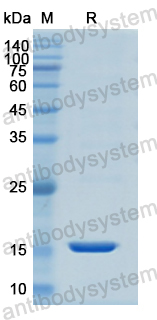Catalog No.
YHC08301
Expression system
E. coli
Species
Homo sapiens (Human)
Protein length
Glu370-Glu489
Predicted molecular weight
16.14 kDa
Nature
Recombinant
Endotoxin level
Please contact with the lab for this information.
Purity
>90% as determined by SDS-PAGE.
Accession
P04264
Applications
ELISA, Immunogen, SDS-PAGE, WB, Bioactivity testing in progress
Form
Lyophilized
Storage buffer
Lyophilized from a solution in PBS pH 7.4, 0.02% NLS, 1mM EDTA, 4% Trehalose, 1% Mannitol.
Reconstitution
Reconstitute in sterile water for a stock solution. A copy of datasheet will be provided with the products, please refer to it for details.
Shipping
In general, proteins are provided as lyophilized powder/frozen liquid. They are shipped out with dry ice/blue ice unless customers require otherwise.
Stability and Storage
Use a manual defrost freezer and avoid repeated freeze thaw cycles. Store at 2 to 8°C for frequent use. Store at -20 to -80°C for twelve months from the date of receipt.
Alternative Names
K1, KRT1, Type-II keratin Kb1, Hair alpha protein, Cytokeratin-1, Keratin-1, CK-1, KRTA, Keratin, type II cytoskeletal 1, 67 kDa cytokeratin
First successful treatment of epidermolytic Ichthyosis with Vunakizumab: A Case Report., PMID:40453098
Hypoxia-induced RHCG as a key regulator in psoriasis and its modulation by secukinumab., PMID:40351602
Exploring TH17-mediated inflammation in epidermolytic ichthyosis: Clinical and mechanistic insight., PMID:40288548
Multi-omic profiling identifies KRT1 as a predictor of immune infiltration and prognosis in gastroesophageal junction cancer., PMID:40232547
USP28 knockdown and small molecule inhibitors promote KRT1 destabilization and sensitize hepatocellular carcinoma cells to sorafenib., PMID:40222446
Molecular mechanism of PP2A/B55α phosphatase inhibition by IER5., PMID:40209703
Sakuranetin modulates IL-17A-related inflammation and enhances skin barrier function in an imiquimod-induced psoriasis model., PMID:40209307
Proteomics Reveals the Role of PLIN2 in Regulating the Secondary Hair Follicle Cycle in Cashmere Goats., PMID:40141352
Keratin 1 modulates intestinal barrier and immune response via kallikrein kinin system in ulcerative colitis., PMID:39958441
KRT9 is required for GBP5 suppression of human respiratory syncytial virus., PMID:39835811
Proteomic Analysis of Plasma Exosomes Enables the Identification of Lung Cancer in Patients With Chronic Obstructive Pulmonary Disease., PMID:39778061
Mass spectrometric detection of keratins in tear fluid., PMID:39761842
CEA-induced PI3K/AKT pathway activation through the binding of CEA to KRT1 contributes to oxaliplatin resistance in gastric cancer., PMID:39644827
Clinical and Genetic Findings in Patients With Palmoplantar Keratoderma., PMID:39630431
ABHD1 Facilitates Intermediate Filament-Mediated Endothelial Cell Chemotaxis by Regulating KRT1 and KRT2 in Diabetic Retinopathy., PMID:39619568
Regulation of keratinocyte barrier function and inflammatory response by the EGFR-STAT3 Pathway: Potential therapeutic implications of osimertinib and afatinib., PMID:39612655
The loss of keratin 77 in murine skin is functionally compensated by keratin 1., PMID:39603462
Anti-Aging and Anti-Inflammatory Effects of Compounds from Fresh Panax ginseng Roots: A Study on TNF-α/IFN-γ-Induced Skin Cell Damage., PMID:39598869
Evaluating the Causal Association between Circulating Plasma Proteins, 731 Immune Cell Phenotypes, and Atopic Dermatitis: A Mediation Mendelian Randomization Study., PMID:39536725
Knockdown of Keratin 6 Within Arsenite-Transformed Human Urothelial Cells Decreases Basal/Squamous Expression, Inhibits Growth, and Increases Cisplatin Sensitivity., PMID:39513911
Variants in the L12 linker domain of KRT10 are causal to atypical epidermolytic ichthyosis., PMID:39072839
Identification of key genes associated with cervical cancer based on bioinformatics analysis., PMID:39060960
Secretory Phenotype in Peripheral Blood Mononuclear Cells of Elderly Patients with Rheumatoid Arthritis., PMID:38814828
Integrative analysis of Iso-Seq and RNA-seq data reveals transcriptome complexity and differential isoform in skin tissues of different hair length Yak., PMID:38773419
Epidermolytic ichthyosis: Clinical spectrum and burden of disease in a large German cohort., PMID:38741524
Treating epidermolytic ichthyosis and ichthyosis with confetti with epidermal autografts cultured from revertant skin., PMID:38739763
Experimental interventions attenuate a conjunctival epidermal metaplasia model., PMID:38679224
The Effect of Retinoic Acid on Arsenite-Transformed Malignant UROtsa Bladder Cancer Cells: In Vitro Model of Basal Muscle-Invasive Bladder Cancer., PMID:38539513
The Mayo Clinic Salivary Tissue-Organoid Biobanking: A Resource for Salivary Regeneration Research., PMID:38464033
HCC-Check: A Novel Diagnostic Tool for Early Detection of Hepatocellular Carcinoma Based on Cytokeratin-1 and Epithelial Membrane Antigen: A Cross-Sectional Study., PMID:38436112
Theacrine enhances autophagy and inhibits inflammation via regulating SIRT3/FOXO3a/Parkin pathway., PMID:38402443
Human cytokeratin 1 plays a role in the interaction of Pteropine orthoreovirus with Hek293 cells but not HeLa cells., PMID:38380604
Lagerstroemia macrocarpa extract inhibits Th2-mediated STAT6 signaling pathway in human keratinocytes., PMID:38354819
Single-cell transcriptome analysis reveals keratinocyte subpopulations contributing to psoriasis in corneum and granular layer., PMID:38279596
Maternal PM2.5 exposure is associated with preterm birth and gestational diabetes mellitus, and mitochondrial OXPHOS dysfunction in cord blood., PMID:38200189
Associations of serum keratin 1 with thyroid function and immunity in Graves' disease., PMID:38019813
Anti-aging Effect of Allium pseudojaponicum in UVA-irradiated Human Epidermal Keratinocytes., PMID:37715405
Molecular Mechanism of PP2A/B55α Phosphatase Inhibition by IER5., PMID:37693604
Non-IgE-reactive allergen peptides deteriorate the skin barrier in house dust mite-sensitized atopic dermatitis patients., PMID:37675143
Novel Quinazoline Derivative Induces Differentiation of Keratinocytes and Enhances Skin Barrier Functions against Th2 Cytokine-Mediated Signaling., PMID:37630370
De Novo Mutation in KRT1 Leads to Epidermolytic Palmoplantar Keratoderma: from Chinese Traditional Treatment to Prenatal Diagnosis Using Whole-Exome Sequencing-Plus., PMID:37566479
Correction: Winkler et al. The Adhesion G-Protein-Coupled Receptor GPR115/ADGRF4 Regulates Epidermal Differentiation and Associates with Cytoskeletal KRT1. Cells 2022, 11, 3151., PMID:37443844
A novel telomerase activity and microRNA-21 upregulation identified in a family with palmoplantar keratoderma., PMID:37419429
Meta-Analysis of Keratoconus Transcriptomic Data Revealed Altered RNA Editing Levels Impacting Keratin Genomic Clusters., PMID:37279397
RNA-seq analysis identifies transcriptomic profiles associated with anal cancer recurrence among people living with HIV., PMID:37177979
Two cases of KRT1 mutation-associated epidermolytic ichthyosis without typical epidermolytic hyperkeratosis in the neonatal skin lesions., PMID:37170713
Evidence for EpCAM and Cytokeratin Expressing Epithelial Cells in Normal Human and Murine Blood and Bone Marrow., PMID:37154563
A Japanese case of Vörner-type palmoplantar keratoderma caused by a novel KRT1 variant., PMID:37122192
Identification of Critical Genes for Ovine Horn Development Based on Transcriptome during the Embryonic Period., PMID:37106791
Proteomic analysis of sialoliths from calcified, lipid and mixed groups as a source of potential biomarkers of deposit formation in the salivary glands., PMID:36949424

